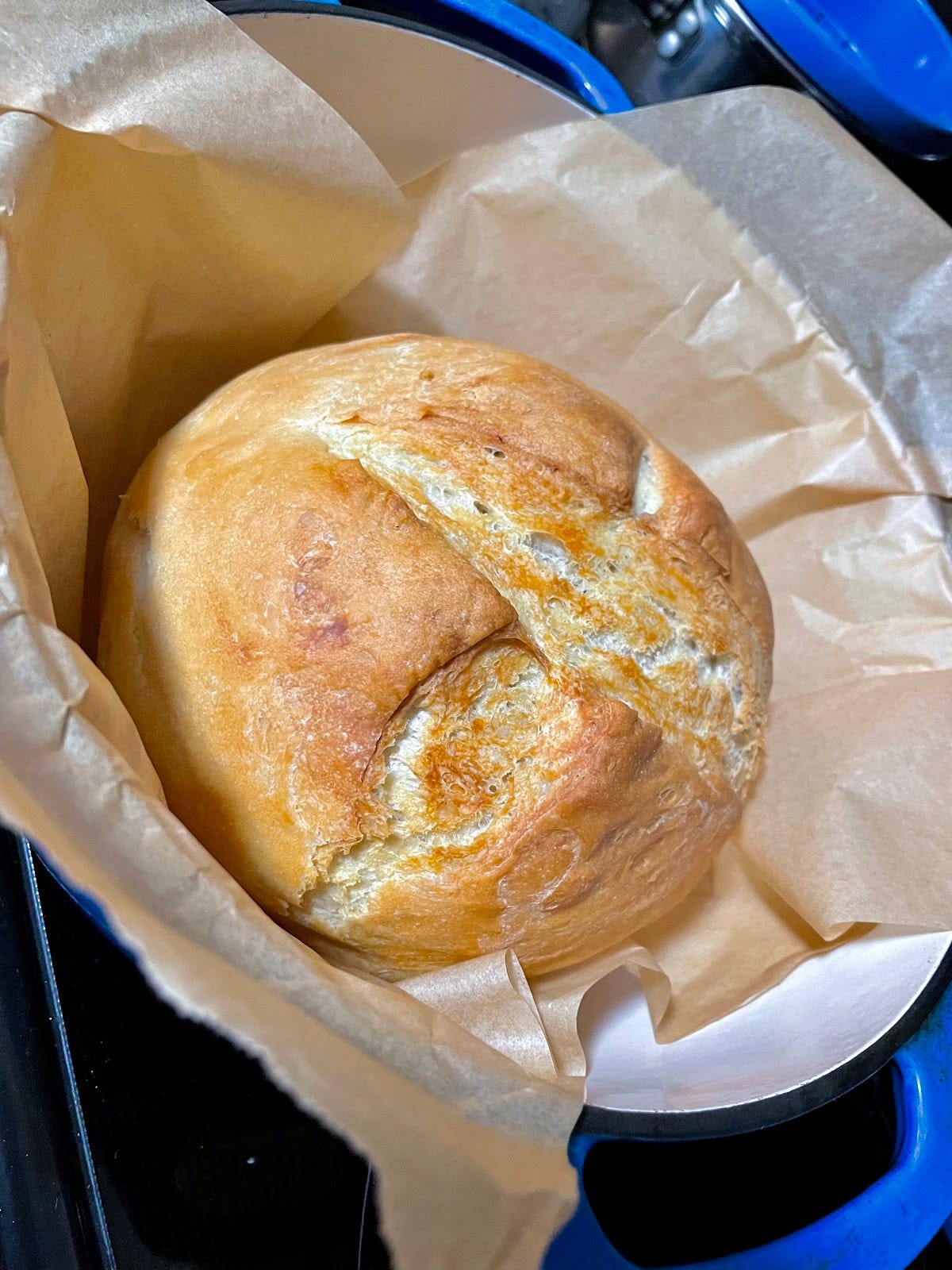Greetings from The University of New Hampshire! We have been getting snow, and snow, and some more snow! I cleared my driveway Saturday morning before going to a late-morning jiu-jitsu practice, and came back to find another inch of snow had fallen while I was gone. But doesn’t it just make everything beautiful? We’re due for a big storm tomorrow night, apparently. I’m glad it's coming at the end of the week so we won’t have to cancel any classes.
I’ve been sick since Monday with a cold, so I’ve been slowed down a bit. Last night I ran a fever for a few hours, so I’m hoping that is the end of it. I stayed home yesterday so that I wouldn’t spread disease and misery, and since I had a day full of online meetings it was actually perfect. What’s great about that is I had time between meetings to make myself a pot of bolognese sauce for lunch, and a slow-cooker beef and barley soup for dinner, along with a happy little boule. There’s nothing like a little comfort food when you are feeling under the weather. Or when the weather is cold and snowy.
I’m still reading Seligman’s Authentic Happiness, a summary of his work on Positive Psychology, and really enjoying it. He directs you to a series of online psychological instruments that can give you insight into various aspects of your personality. I took one the other day that I thought was particularly interesting - VIA Survey of Character Strengths. I’ll write more about it below. But I am going to definitely have my students take this test, probably instead of the Myers-Briggs. I am finding a lot of value in Positive Psychology and a lot of overlap between my own project on human flourishing. One thing that stands out as I read the Positive Psychology literature is that it is relatively value-free. It focuses on human happiness and flourishing, but they don’t talk about ethics at all. It could be that it is just assumed, but I still think there is a component of ethics that has to be incorporated into any full model of human flourishing.
OK - let’s get to the links. Let me know if you try the bolognese or beef stew! As usual, willing good for all of you!
**
Read
What: Authentic Happiness, VIA Survey of Character Strengths
It is free, but I think you need to create an account to do this. Go to
https://www.authentichappiness.sas.upenn.edu/
, then choose “Questionaires”, then “Via Survey of Character Strengths”.
Why: This instrument is based on a cross-cultural study of virtues. They come up with a list that include “judgement, critical thinking, and open-mindedness”, “bravery and valor”, “modesty and humility”, and so forth. The idea is they are ubiquitous (not necessarily universal) across almost all cultures. Seligman’s argument is that you live your best life when you are leaning into your strengths. So if you can identify your strengths and look for work and relationships where you can use your strengths, you will be happier. The instrument takes about 25 minutes - it has 240 questions. But it’s interesting. I found it useful. It provides you a report at the end with a ranking of how you score on all 24 strengths. There isn’t a wrong answer - they are all good. I think my results are pretty accurate - at least for where I am right now in my life. It’s definitely worth the time.
**
What: the FP, What Socrates Teaches Us About Love, Politics, and Death
Why: Philosopher Agnes Callard argues that the essence of Socrates’ philosophy was an acknowledgement of ignorance, and that ignorance is the source of all our failings. This is actually a charitable take on human frailty - we wouldn’t do the wrong thing if we really knew better.
**
What: WSJ, Gramm and Summers: A Letter on Tariffs From Economists to Trump
Why: President Trump used tariffs in his first term as a means of negotiation. President Biden added on to President Trump’s first term tariffs in the mistaken belief that tariffs create jobs by channeling production back to the US. Now Trump is looking to do more. Trump is also obsessed with the trade deficit, as if that is a bad thing in and of itself. But the trade deficit is not necessarily a bad thing. The flip side of a trade deficit is a foreign investment surplus (you can’t have one without the other). Foreign investment is good - it is free capital that comes into the US to finance the building of factories, roads, homes, and other things that we value - most of which create jobs.
This letter is a mini lesson in why tariffs are bad. It does not adequately focus on the power that it gives politicians enough, which simply leads to corruption, but it is otherwise very good.
**
Watch
What: Alice Foeller | TEDxNewAlbany, How to live fully after something bad happens (17 min)
Why: Foeller relates how she moved on from personal loss. She doesn’t offer a playbook so much as a stance. She calls it volition: choosing not to let the bad thing be the end of your story. Similar message to what I wrote about in the last FITW, she chooses a redemption story rather than a contamination story.
**
Listen
What: EconTalk, Why AI Is Good for Humans (with Reid Hoffman) (80 min)
Why: Reid Hoffman is, among other things, the founder of LinkedIn. He offers that AI is going to change the human experience, but that it will make it richer, not worse.






